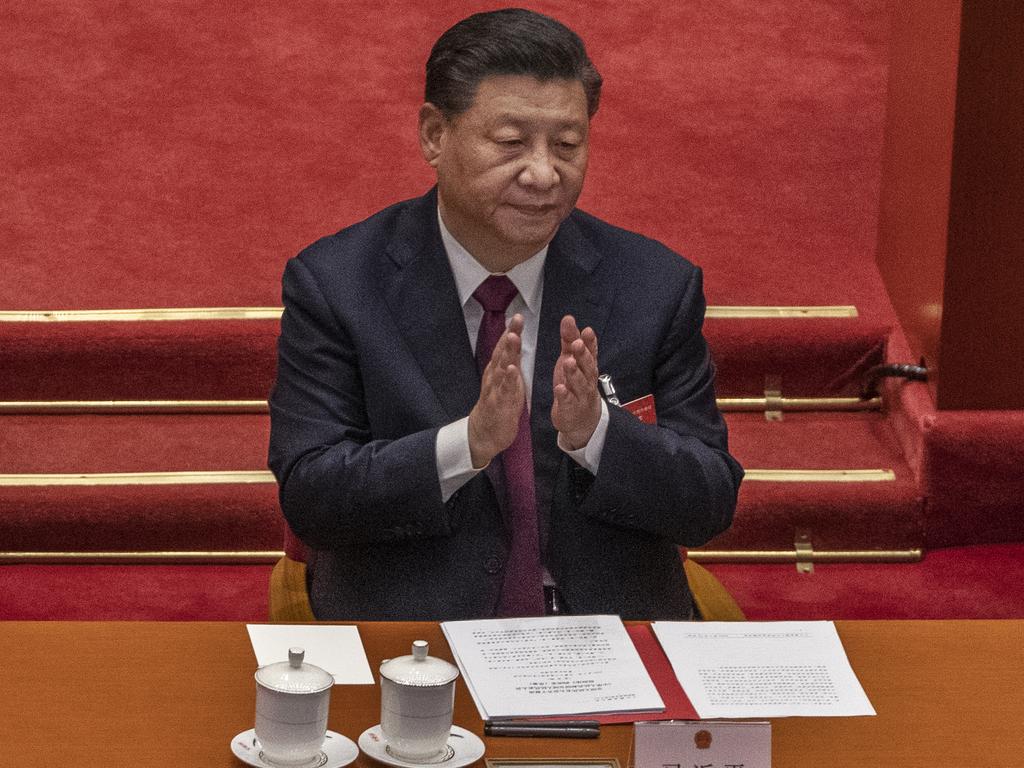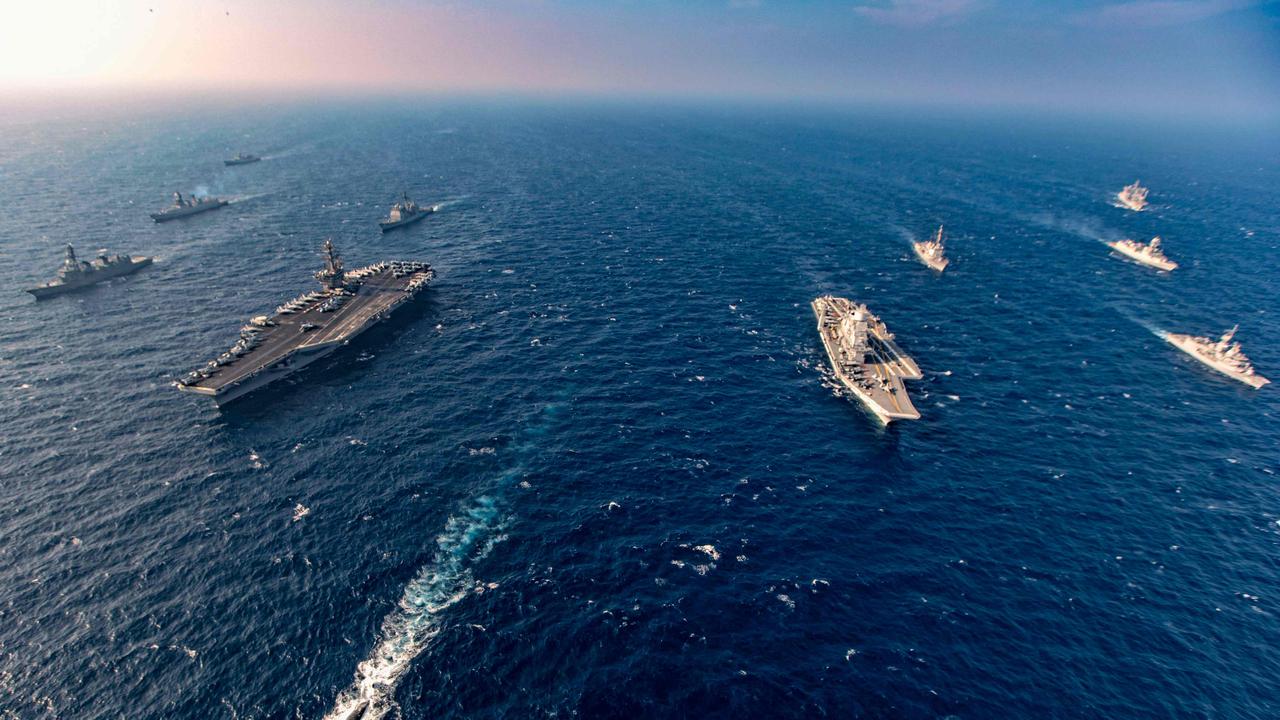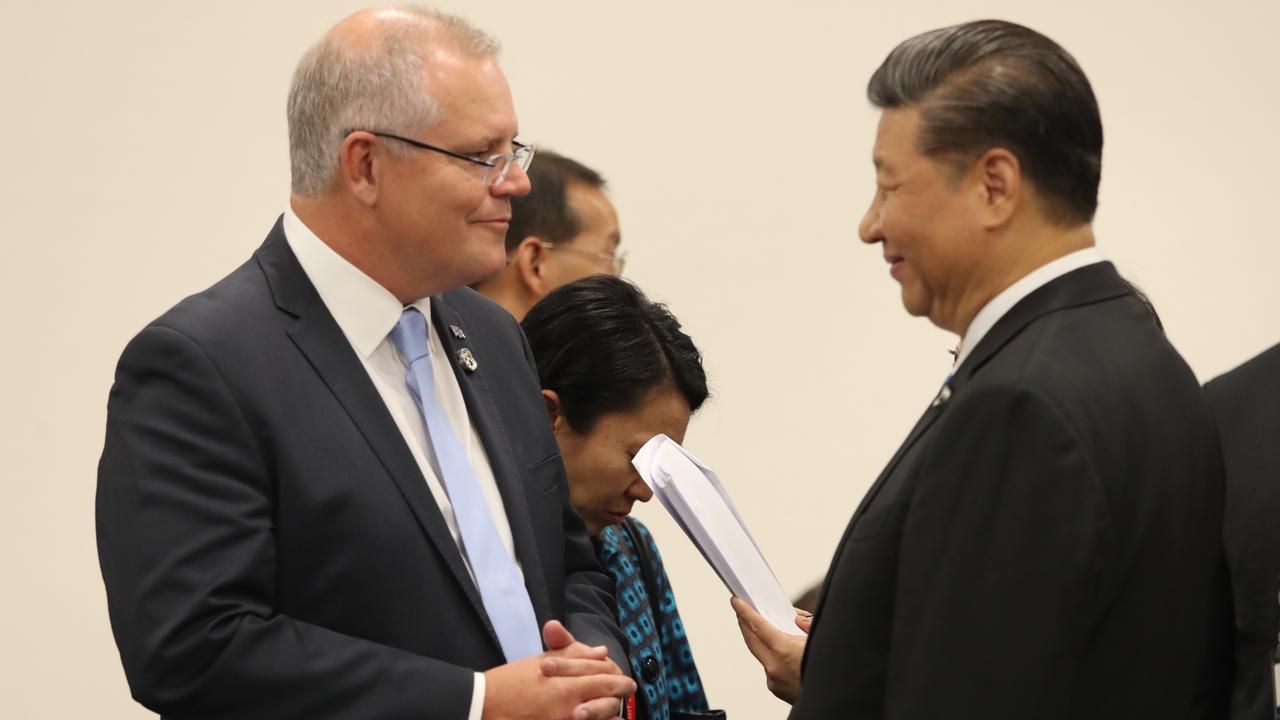Australia joining The Quad will not affect China’s ‘peaceful rise’ to power, expert says
In a watershed moment, Australia, Japan, India, Japan and the US are making moves that Beijing has labelled the “empty talk club”.
Chairman Xi Jinping this week told the annual Two Sessions national Communist Party assembly: “Our country’s current security situation is largely unstable and uncertain.”
His country’s opponents would argue it’s an instability created by his authoritarian brand of wolf-warrior diplomacy.
Xi loudly proclaims “win-win” scenarios for all who participate in his Belt-and-Road infrastructure program. But this promise of mutual prosperity has been gravely undermined by Beijing’s extreme military build-up and aggressive territorial posturing, along with economic punishment and ‘debt-trap’ tactics.
Now the targets of such coercion are banding together.
RELATED: World unites in pushback against China

Facing the prospect of a new world order based on the interests of Xi’s regime, India, Japan, the US and Australia have revived their stalled Quadrilateral Security Dialogue (Quad).
On Friday, the leaders of this loose affiliation of like-minded democracies had their first formal joint meeting.
It’s a watershed moment for the Indo-Pacific.
It’s a major embarrassment to China’s loudly proclaimed (but poorly performed) “peaceful rise”.
It’s a position of strength from which the US will conduct its first high-level government contact with Beijing at an Alaska conference next week.
PEACE IN OUR TIME?
US Secretary of State Antony Blinken and National Security Adviser Jake Sullivan will meet in Anchorage, Alaska, on March 18 with Chinese Politburo member Yang Jiechi and Foreign Minister Wang Yi.
It’s not likely to be all tea and biscuits.
And President Biden has been working to put his diplomats in a powerful position.
Mr Blinken has already spoken with his counterparts in Tokyo and Seoul. And Mr Biden himself took part in Friday’s Quad leadership virtual conference with Prime Minister Scott Morrison, Japan’s Prime Minister Yoshihide Suga and India’s Prime Minister Narendra Modi.
The tone for the US-China talks has already been set.
RELATED: Large-scale war: Grave warning for Japan

In February, Mr Blinken raised issues including the Myanmar coup, the intimidation of Taiwan, the abandonment of Hong Kong handover agreements and the ‘genocide’ of Xinjiang’s Uighur people. Mr Yang responded with a curt demand that the US respect China’s “sovereignty” and not to “slander” Beijing’s reputation.
Mr Biden later described Beijing as Washington’s “most serious competitor”.
“But we’re also ready to work with Beijing when it’s in America’s interest to do so. We’ll compete from a position of strength by building back better at home and working with our allies and partners,” he said during a State Department speech.
Which is why he immediately set about reinvigorating the nascent Quadrilateral Security Dialogue.
‘EMPTY TALK CLUB’
Beijing isn’t impressed.
“Days before the meeting, Japan, India and Australia couldn’t help but again hype the ‘China threat’,” intoned an editorial in the Communist Party-controlled Global Times on Wednesday.
“These interactions before the Quad summit have reiterated the cliché over China, trying to create an image that the group is united,” writes international affairs editorialist Mu Lu. “Before they can assure that they will not be brought into another pit by the US, perhaps they have no other choice but to find relief in bolstering each other’s boldness.”
Chinese media has labelled the Quad as an “empty talk club” made up of selfish nations with competing agendas.
“Chinese experts believe the US’ test will end up in dismay, as other members in the club have an ‘all-for-itself’ agenda, and won’t tie themselves to the US’ scheme. The divergences in each country’s goals will eventually dissipate the Quad, which will make it resemble an ‘empty talk club,’” instead of a security alliance,” the Global Times proclaimed on March 8.
Chinese Academy of Social Sciences fellow Lu Xiang told the Times that “an anxious” Washington wanted to take charge of the “small circle of the Quad”. But “the framework will eventually resemble an “empty talk club” instead of a real security alliance”, he said.
DIVIDE AND CONQUER
Beijing’s wolf-warrior diplomats and propagandists have been actively attacking perceived weaknesses in Quad relationships.
In particular, it has targeted India.
“New Delhi cannot afford the cost of provoking China by publicly taking sides between Beijing and Washington,” China Institute of International Studies senior fellow Yang Xiyu told state-run media this week. “The US wants to seize India as weight to retake its hegemony in the Indo-Pacific region and counter China, and India plans to showcase its co-operation with the US to bluff in front of China regarding its influence.”
China’s Foreign Minister Yi then appeared to forget recent history by declaring Beijing and New Delhi to “share the same or like-minded stances towards many major issues which makes China and India friends and partners, not threats and opponents to each other.”
However, the elephant in the room is the continued presence of Chinese troops in disputed sections of its 3500km Himalayan border with India. And then there’s its naval survey activities in the Andaman Sea and Indian Ocean.
But India’s long tradition of refusing to align with the world’s great powers remains part of its national psyche.
BLAME GAME
Former diplomat Talmiz Ahmad this week lashed out at moves to strengthen India’s Quad relationships, insisting Beijing’s behaviour was New Delhi’s own fault.
He blames the recent border face-off in the mountainous Ladakh region as “China’s sharp response to the steady shift in India’s regional posture favouring an alignment with the US and its allies against China”.
“Despite rhetoric relating to the promotion of a ‘rules-based’ world order (the rules being most frequently violated by the US itself), the Quad neither shares a strategic vision nor is it animated by a shared agenda,” he writes.

Another dissenting voice is National University of Singapore Asia Research Institute fellow Kishore Mahbubani.
“China will be patient because time is working in its favour,” he writes in Foreign Policy. “In 1980, the economies of China and India were the same size. By 2020, China’s had grown five times larger. The longer-term relationship between two powers always depends, in the long run, on the relative size of the two economies.”
WEAKEST LINKS
“The Quad will not alter the course of Asian history for two simple reasons,” Mr Mahbubani argues. “First, the four countries have different geopolitical interests and vulnerabilities. Second, and more fundamentally, they are in the wrong game. The big strategic game in Asia isn’t military but economic.”
He says strengthening defence and strategic co-operation “will not move the needle of Asian history”.
“Over time, the different economic interests and historical vulnerabilities of the four countries will make the rationale for the Quad less and less tenable.”

Australia, he says, is an example of the weakness of the Quad.
“Australians have been proud of their remarkable three decades of recession-free growth. That happened only because Australia became, functionally, an economic province of China,” he writes.
“Now Australia has dug itself into a hole. All of Asia is watching intently to see who will blink in the current Australia-China standoff.
“In many ways, the outcome is predetermined. If Beijing blinks, other countries may follow Australia in humiliating China. Hence, effectively, Australia has blocked it into a corner.”
A QUAD PLUS?
An increasing number of Asian nations are defying Beijing’s fait accompli.
“As China rapidly rewrites international rules to better reflect its desires, it’s hardly surprising that others are responding by protecting their own interests,” Yan Bennett and John Garrick recently wrote for the Australian Strategic Policy Institute.
Which is why the loose Quad partnership is growing in popularity.
Vietnam, South Korea and New Zealand have already engaged with the Quad cooperative framework to co-ordinate their response to the COVID-19 pandemic. Now Beijing’s giving them even more motivation to formalise such ties.
“China dangles the promise of access to the vast riches of its markets, but penalises nations that criticise it by imposing punishments including ultra-high tariffs, denial of market access, predatory economics and even imprisonment of foreign citizens, among other coercive tactics,” Bennett and Garrick argue.
On Wednesday, Seoul stated that it was considering joining the regional security forum. An anonymous official told local reporters that “as long as it abides by international norms” and conducted its affairs in a “transparent, open and inclusive manner”, consultations with the Quad partnership would proceed over the coming months.
But Mr Mahbubani argues such resistance is futile.
He says the post World War II international order cannot stand in the face of Beijing’s raw economic power.
“Just as the massive US consumer market in the 1970s and 1980s defeated the Soviet Union, the massive and growing Chinese consumer market will be the ultimate decider of the big geopolitical game.”
Jamie Seidel is a freelance writer | @JamieSeidel
Originally published as Australia joining The Quad will not affect China’s ‘peaceful rise’ to power, expert says



